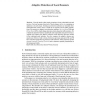Free Online Productivity Tools
i2Speak
i2Symbol
i2OCR
iTex2Img
iWeb2Print
iWeb2Shot
i2Type
iPdf2Split
iPdf2Merge
i2Bopomofo
i2Arabic
i2Style
i2Image
i2PDF
iLatex2Rtf
Sci2ools
ACNS
2006
Springer
2006
Springer
Adaptive Detection of Local Scanners
Network attacks often employ scanning to locate vulnerable hosts and services. Fast and accurate detection of local scanners is key to containing an epidemic in its early stage. Existing scan detection schemes use statically determined detection criteria, and as a result do not respond well to traffic perturbations. We present two adaptive scan detection schemes, Success Based (SB) and Failure Based (FB), which change detection criteria based on traffic statistics. We evaluate the proposed schemes analytically and empirically using network traces. Against fast scanners, the adaptive schemes render detection precision similar to the traditional static schemes. For slow scanners, the adaptive schemes are much more effective, both in terms of detection precision and speed. SB and FB have non-linear properties not present in other schemes. These properties permit a lower Sustained Scanning Threshold and a robustness against perturbations in the background traffic.
Related Content
| Added | 13 Jun 2010 |
| Updated | 13 Jun 2010 |
| Type | Conference |
| Year | 2006 |
| Where | ACNS |
| Authors | Ahren Studer, Chenxi Wang |
Comments (0)

